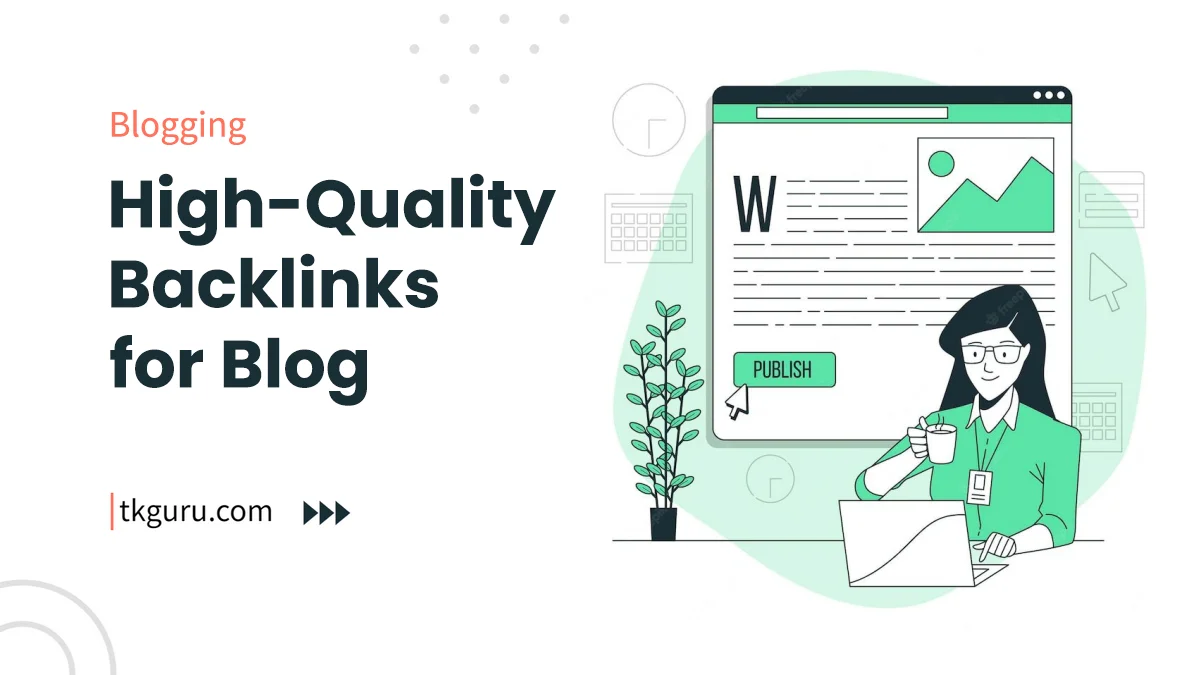Advertisements
Ratings

High-Quality Backlinks for Blog – In the vast digital landscape, backlinks serve as the backbone of successful search engine optimization (SEO) strategies.
They play a pivotal role in determining a website’s authority, credibility, and search engine rankings.
As a blogger, securing high-quality backlinks should be a cornerstone of your SEO efforts.
In this article, we will delve into effective strategies for obtaining quality backlinks that can enhance your blog’s online visibility and authority.
Contents
- 1. Understanding Backlinks
- 2. Content Creation for Link-Worthy Material
- 3. Outreach and Relationship Building
- 4. Leveraging Social Media and Online Communities
- 5. Creating Linkable Assets
- 6. Broken Link Building
- 7. Participating in Interviews and Podcasts
- 8. Building a Strong Internal Link Structure
- 9. Monitoring and Analyzing Backlink Quality
- Conclusion
- High-Quality Backlinks for Your Blog FAQs
1. Understanding Backlinks
Before we dive into the strategies, let’s grasp the basics of backlinks. A backlink, also known as an inbound link or incoming link, is a hyperlink from one website to another.
Search engines view backlinks as votes of confidence, implying that if reputable websites link to your content, it must be valuable. Backlinks can be categorized into:
- Dofollow and Nofollow: Dofollow backlinks pass authority, while nofollow backlinks carry a no-follow directive and do not directly influence SEO rankings.
- Internal and External: Internal links connect different pages within your blog, while external links point to content on other websites.
2. Content Creation for Link-Worthy Material
- High-Quality Content: The foundation of acquiring backlinks lies in producing high-quality, valuable, and relevant content. Content that offers unique insights, solves problems, or addresses current trends is more likely to attract backlinks from other websites.
- In-Depth Guides and Resources: Crafting comprehensive guides, tutorials, and resources positions you as an authoritative source. Websites seeking to provide their audience with valuable information are more inclined to link to such authoritative content.
- Original Research and Data: Conducting original research or surveys in your niche generates unique data that other content creators may reference. This originality increases the likelihood of receiving backlinks from those who use your data to support their arguments.
3. Outreach and Relationship Building
- Guest Posting: Guest posting involves writing articles for other reputable websites in your niche. In return, you receive a valuable backlink to your blog. Choose websites with a similar audience and ensure your guest posts provide exceptional value.
- Influencer Collaboration: Collaborating with influencers allows you to tap into their audience while gaining backlinks from their platforms. Share valuable content with influencers that align with your niche and values.
- Blogger Outreach: Establish relationships with fellow bloggers by engaging with their content, leaving thoughtful comments, and participating in relevant discussions. This connection might lead to guest post opportunities or organic backlinks.
4. Leveraging Social Media and Online Communities
- Sharing Valuable Content: Sharing your blog posts on social media platforms exposes your content to a broader audience. If your content resonates, it may catch the attention of influencers or bloggers who could potentially link to it.
- Engaging in Online Forums: Participate in online forums and communities related to your niche. Offer helpful insights, answer questions, and contribute to discussions. When relevant, share your blog posts as additional resources.
5. Creating Linkable Assets
- Infographics and Visual Content: Visual content like infographics can convey complex information in an easily digestible format. When others find your infographics useful, they may embed them in their content and link back to your blog.
- Templates and Tools: Develop templates, calculators, or tools that cater to your target audience’s needs. These practical resources can attract backlinks from bloggers seeking to enhance their readers’ experience.
- Case Studies and Success Stories: Share detailed case studies or success stories that demonstrate how your strategies, products, or services have made a positive impact. Authentic stories can spark interest and earn backlinks.
6. Broken Link Building
- Identifying Broken Links: Use tools to identify broken links on reputable websites in your niche. Broken links present an opportunity for you to suggest your relevant content as a replacement.
- Outreach for Replacement: Reach out to the website owner, politely informing them about the broken link and offering your content as a valuable replacement. This approach provides mutual benefit.
7. Participating in Interviews and Podcasts
- Guest Interviews: Participate in podcast interviews to showcase your expertise and insights. These appearances often come with backlinks from the podcast show notes or related blog posts.
- Q&A Sessions: Engage in Q&A sessions on platforms like Quora. Providing informative answers can position you as an authority, prompting others to visit your blog and potentially link to your content.
8. Building a Strong Internal Link Structure
- Internal Linking Strategy: A robust internal linking strategy enhances user experience and guides readers to relevant content within your blog. Internal links also distribute authority across your site.
- Linking to Relevant Posts: Strategically link to relevant posts within your blog to create a logical flow of information for readers. This practice improves user navigation and encourages them to explore further.
9. Monitoring and Analyzing Backlink Quality
- Backlink Audit: Conduct periodic backlink audits to identify and address low-quality or spammy backlinks. Google’s Disavow Tool allows you to disassociate from undesirable links.
- Tools for Monitoring: Utilize tools such as Ahrefs, Moz, and SEMrush to monitor your backlink profile, track new links, and assess their impact on your SEO efforts.
Conclusion
Earning quality backlinks for your blog is a journey that requires a combination of content excellence, outreach, and relationship building.
Remember, the key lies in providing value to your audience and the wider online community.
By implementing the strategies mentioned in this article, you can enhance your blog’s authority, boost search engine rankings, and establish your blog as a trusted resource in your niche.
As you embark on this journey, keep your content SEO-friendly, easily understandable, and relevant to your target audience.
The process of acquiring quality backlinks requires patience, persistence, and genuine effort, but the rewards in terms of improved SEO performance and increased traffic are well worth it.
High-Quality Backlinks for Your Blog FAQs
What are backlinks, and why are they important for my blog?
Backlinks are links from other websites to your blog. They are important because they can improve your blog's search engine rankings, increase your site's authority, and drive organic traffic. High-quality backlinks indicate to search engines that your content is valuable and trustworthy.
How can I obtain high-quality backlinks for my blog?
To acquire high-quality backlinks, you can:
- Create valuable and shareable content that naturally attracts links.
- Reach out to other bloggers or websites in your niche for guest posting opportunities.
- Participate in online communities and forums, sharing your expertise and linking back to your blog when relevant.
- Collaborate with influencers or industry experts who can link to your content.
- Ensure your blog is listed in relevant directories and industry-specific websites.
Are all backlinks equal in terms of quality?
No, not all backlinks are of equal quality. High-quality backlinks come from authoritative and reputable websites within your niche. They should be natural and relevant to your content. Low-quality or spammy backlinks can harm your blog's SEO and reputation, so it's important to focus on quality over quantity.
Should I buy backlinks to boost my blog's SEO?
No, you should not buy backlinks. Search engines like Google can detect paid or spammy backlinks, and this can result in penalties that harm your blog's ranking. Instead, focus on organic methods to earn high-quality backlinks through content creation, outreach, and building relationships within your industry.
How can I monitor the effectiveness of my backlink-building efforts?
You can monitor your backlink-building efforts by using tools like Google Analytics and specialized backlink analysis tools. Track the number of backlinks, their quality, and their impact on your blog's traffic and search engine rankings. Regularly reviewing your backlink profile can help you adjust your strategy for better results.
| Web Hosting | Website |
| WordPress | Google Adsense |
| SEO | Affiliate Marketing |
| Blogging | YouTube |
Recent Posts
- Windows vs Mac: Choosing the Ideal Laptop for Your Needs
- 10 Best Budget Friendly Laptops for Bloggers with Impressive Performance
- Top MacBook Models for Blogging Professionals
- 10 Best Laptops for Content Creators in 2023
Related Tags
High quality backlinks for your blog free, high-quality backlinks free list, how to get quality backlinks, how to get backlinks for free, how to create backlinks step-by-step, how to create backlinks free, what are backlinks, how to create backlinks in seo,






